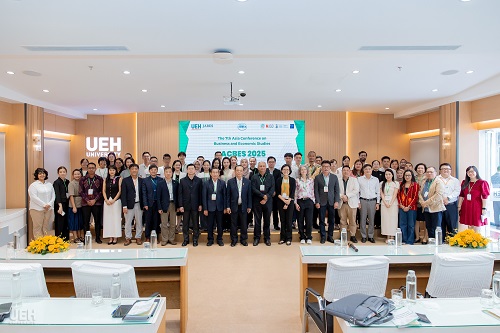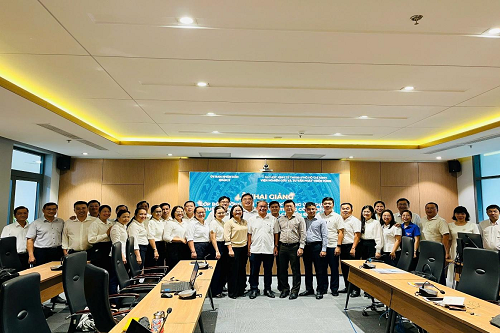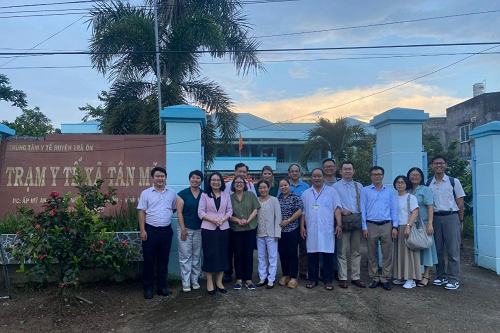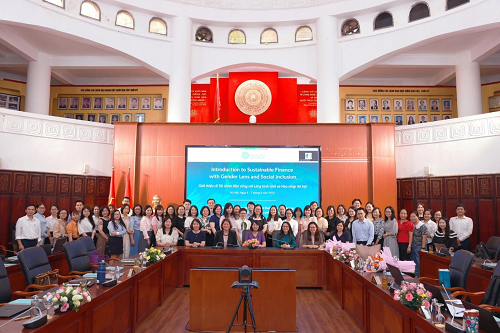
Solutions towards Digital Accounting for Small and Medium Enterprises in Vietnam
23 Aug, 2022
In the wave of strong technology development, finance - accounting is the priority activity for digital transformation and leading technology application in enterprises. However, the implementation of digital accounting at small and medium enterprises (SMEs) in Vietnam is a complicated process due to the influence of diverse factors. Through the article, the authors emphasize the need to raise the awareness of SMEs, to reform the policy structure and to highlight the benefits that digital transformation bring in the direction of integration besides suggesting some proposed solutions and suitable recommendations.

Digital accounting and digital accounting application
Digitization is not only a technological innovation but also includes the way that companies and enterprises manage production and business processes in their units. Accounting work at economic units focuses on activities, including activities of collecting, processing, examining, analyzing and providing economic and financial information. The arrival of Industry 4.0 is predicted to create significant impacts on the accounting field. Specifically, the electronic network (Internet) will be used as a means of communication for the exchange of accounting information, and at the same time, accounting processes will be redesigned through the use of electronic networks and digital information. Therefore, in this study, digitalization is defined as the process of digitizing and automating accounting processes based on modern technologies. The application of digital technology will bring many benefits to the unit, including a shorter cycle time compared to those of the traditional process because of frequent activities listed as credit approval, payment and money collection, transaction processing, closing, reporting and so on are reduced; the wider range of operating space; the improved service delivery time; the reduced error rate in the processing of transactions; the reduced number of employees in the accounting apparatus and the improved labor efficiency of the accounting department; the saved cost of record keeping; the improved efficiency of information security. However, the acceptance and the application of the developments generated by a series of modern IT advances are always associated with the process of change of the whole society, especially in terms of perception. Once one society, especially SMEs, is aware of the positive aspects as well as the benefits of applying digital technology, the implementation will quickly achieve success.
Some proposed solutions and recommendations to raise awareness concerning digital accounting implementation in small and medium enterprises in Vietnam
Some solutions
In order to help small and medium-sized enterprises (SMEs) be effective in implementing and applying the advances of Industry 4.0, especially applying digital technology to the organization of accounting at the unit, some synchronous solutions need to be implemented as follows.
* The solution group related to the legal environment:
- Establishing a legal corridor for digital authentication and authentication on all transactions performed in the network environment in order to facilitate the implementation of digital application in SMEs.
- Establishing a legal corridor in digital implementation and application for the unit's operations, especially applying digital technology in SMEs to create a playing field with fair competition and fair competition among firms participating in the economy.
- Establishing a legal framework for sharing, exploiting, using and reusing data, storing (storage form, storage time) of data, and data security for digital technology application.
* The solution group related to information technology management:
- Promoting investment and building modern IT infrastructure to create the best conditions for the process of applying digital technology in SMEs.
- Focusing on data security by increasing investment in equipment for information security and preventing illegal infiltration of the unit’s database.
- Focusing on training and fostering human resources at SMEs with IT skills and capabilities to ensure the effective implementation of digital technology.
- In addition, the investment and the development of human resources for this type of enterprise should be concerned and promoted.
* The solution group related to human resource management:
- Managers need to profoundly change their management perspective and skills from managing people who perform repetitive and transactional tasks to information management and integrated analytical tools.
- Managers need to have appropriate solutions to improve their understanding of digital technology and the application of digital technology in their units because the management and investment decisions of SMEs are made by the leaders of the unit. On that basis, managers will have enough knowledge and ability to identify challenges posed by the presently implementation in their industry to have appropriate regulatory solutions.
Deploying digital tools is often inadequate for businesses to achieve a sustainable competitive advantage. Therefore, managers need to be aware of the resources needed for each stage in the roadmap to implement the digital technology in order to fully equip all resources for the organization to create the best conditions for the digital technology implementation at the unit. Accordingly, resources on IT infrastructure and appropriate financial resources are very important factors.
In addition, the support of the manager is a factor proven to have a significant influence in the process of implementing the digital technology application. Therefore, in addition to investing in the necessary infrastructure, all relevant groups of employees must have access, training, and incentives to adopt these IT tools. Accordingly, managers need to provide training and refresher courses to improve their professional qualifications and IT application level for employees at the unit, especially those in charge of accounting. accounting at the unit.
* For accountants:
Auditors need to realize that the implementation of the application of digital technology is an objective necessity of the unit to keep up with the economic development momentum in the region and in the world. With the awareness that this is an objective necessity, the auditor will have the motivation to continue making efforts for the application of digital technology and be able to overcome all difficulties in the application process.
Constantly improving and learning to improve professional qualifications and modern IT application capacity.
Some recommendations
* For the Government:
- Developing a strategy to develop the accounting field at SMEs in the short and long term in the direction of applying digital technology to accounting activities at the unit in the direction of ensuring synchronous and efficient operation with Vietnamese accounting standards and international accounting standards along with scientific and technical advances of the Fourth Industrial Revolution.
- Although digital transformation is proven to have profound impacts on all types of businesses, concerns concerning investments in modern IT still exist in some businesses. Small and medium-sized enterprises (SMEs) are considered to have insufficient resources or experience to carry out innovative activities compared with large-scale enterprises, therefore, the introduction of supportive policies on capital and physical infrastructure for this type of enterprise in the digital transformation process is a matter of concern.
- Developing and perfecting a system of Legal Documents that clearly stipulates tools related to digital technology as well as how to apply these tools in order to maximize the effectiveness of the provision of these tools as useful, honest and objective information for information users and stakeholders, as well as preventing illegal acts in the process of applying digital technology at the unit and creating a fair competitive environment strength among enterprises participating in activities in the market.
- Building and perfecting a legal document system that clearly stipulates the inspection and examination of the process of applying digital technology in SMEs. Accordingly, legal documents need to have specific regulations on the qualifications and capacity of the person assigned to undertake the inspection and examination, functions, tasks and powers of the person assigned to undertake the work. This as well as specific regulations on penalties for violations in the process of applying digital technology in SMEs.
* For governing bodies:
- Management agencies need to play a central role in the management and coordination of human resources to support, guide and ensure compliance with legal regulations for SMEs that are implementing and applying digital technology as well as solving network security issues. In addition, management agencies need to develop solutions to provide timely support in terms of facilities for SMEs, which are recognized as having limited experience and resource forces in implementing digital transformation (Kowalkowski et al., 2013).
- Management agencies need to have solutions to raise awareness of all sectors of society regarding the positive aspects of digital transformation activities, especially the implementation of digital technology application in SMEs.
- Management agencies need to develop a roadmap for human resource development in the short and long term for the accounting industry in general and for auditors serving the SME sector in particular. The development roadmap should be associated with financial support mechanisms for training, retraining and improvement of qualifications for auditors who are undertaking accounting work at SMEs.
- Management agencies should have policies to encourage the establishment of professional associations and organizations for research, technology and knowledge transfer, training, fostering and promoting the application of modern technologies in order to contribute to support enterprises in general and SMEs in particular in the process of applying digital technology at the unit.
* For small and medium enterprises:
- SMEs need a change in thinking and awareness concerning the role of digital transformation, specifically the implementation of digital transformation in their units. Accordingly, SMEs need to be aware that the application of digital technology is a decisive factor for their success in the context of Industry 4.0.
- Small and medium-sized enterprises need to develop a strategy to apply digital technology in accordance with the provisions of law and the actual situation at the unit. In the process of digital transformation, effective cost control is always a top concern of SMEs (Kowalkowski et al., 2013). Therefore, SMEs need to have a strategy to allocate all resources appropriately. In addition, it is necessary to develop a number of performance indicators to evaluate the results achieved in the process of applying digital technology to promote the achievements as well as solutions to overcome the arising limitations within the process of implementing the application of digital technology.
- SMEs need to build an accounting system in accordance with the provisions of the law and the actual situation at the unit in order to maximize the effectiveness of the application of digital technology. In addition, SMEs need to focus on developing accounting human resources with high professional qualifications and modern IT application capacity by appointing auditors at the unit to participate in training programs. periodic training. At the same time, these units need to consider the development and application of reward policies to encourage the auditors at the unit to constantly strive to improve their professional qualifications to meet professional needs and forms of treatment upon handling cases that are not active in improving professional capacity.
Please refer to the full research Solutions towards Digital Accounting for Small and Medium Enterprises in Vietnam here. Author group: Assoc. Prof. Dr. Phạm Quang Huy and MSc. Vũ Kiến Phúc – UEH Department of Accounting. This writing is in series of spreading researches and applied knowledge with “Research Contribution For All – Nghiên Cứu Vì Cộng Đồng” message, UEH would like to invite Dear readers to look forward to the following Newsletter.
News photos: Author group, UEH Department of Marketing – Communication















